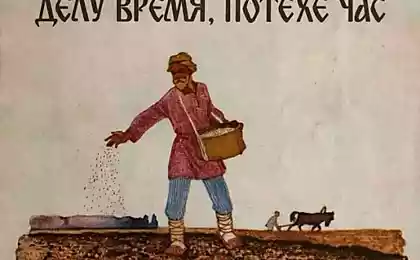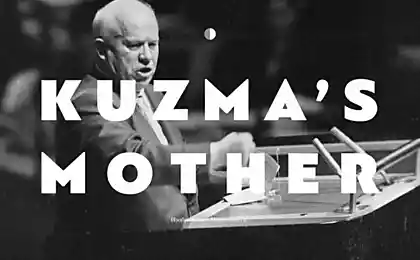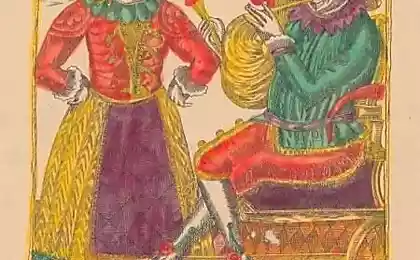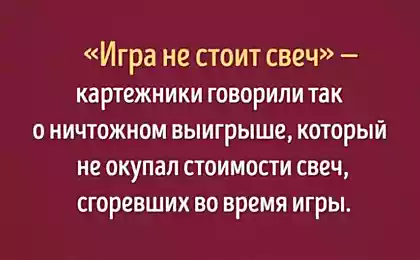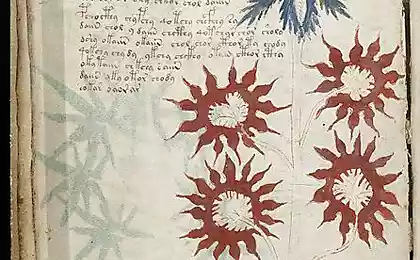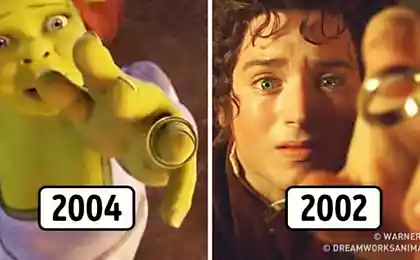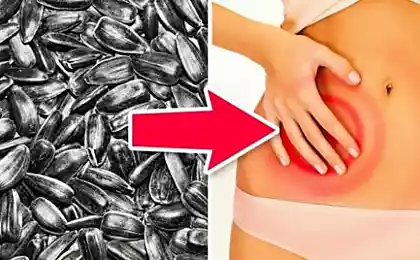1477
Where went the expression ... (13 pics + text)
In everyday life, we often use different kinds of expressions, sayings, adjectives, etc. And all of us know the history of these expressions. Most of the numerous expressions suggest to learn about some of them.
1. "led by the nose»
Previously Roma entertain people at fairs, speaking with the bears. They made animal prodelyvat different foci, thus deceiving the promise of handouts. Gypsies drove bear the ring, threaded through the nose. It is in those times "do not lead me by the nose" means "do not lie." But the expression "to know the whole story," ... linked with ancient torture when the accused drove nails under the nails or needles. The purpose of this action was rather unpleasant obtaining recognition.
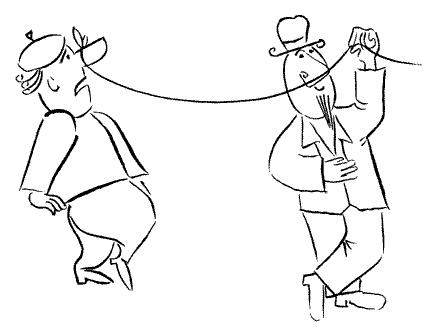
2. "Master cabbage»
About who is little that can, we say "the master of cabbage." The origin sayings is quite simple. Sour soup (apparently, in the simplest variation) were nemudrёnoy food Water yes sauerkraut. Prepare the soup was not difficult. And if someone called "the master of cabbage", which meant that anything worthwhile he is unfit. The expression "put a pig", that is to make someone something bad, most likely due to the fact that some people for religious reasons do not eat pork. And if a man quietly eating pork underlay, thereby making it a very serious dirty trick.
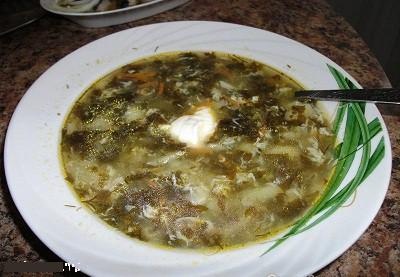
3. "twiddle»
Today, the expression "twiddle" means do nothing. Meanwhile, earlier bitё thumbs employed. Although quite simple ... Dishes in distant times already mainly made of wood: cups and spoons, "Bratina" and plates - everything was made of wood. But to cut something from the logs needed to chip chock - thumbs. It was easy, trifling matter, which was instructed to apprentices. This activity is called "beat the thumbs." Master jokingly called laborers "baklushechnikami." So, masters of jokes and there was an expression.
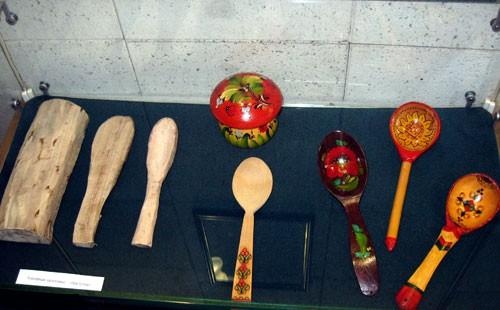
4. "I do not hit to the court»
When engaged in the study of proverbs and sayings, wonders of antiquity which they sometimes occur. "I do not fell to the court" - at this saying has an interesting mythological basis. According to her courtyard (in the yard) will live only animal that like houses. And if you do not like it, or run away, or get sick. What to do ... not to the court ...
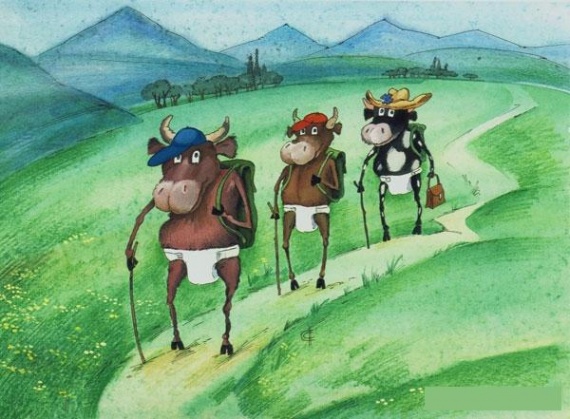
5. "Scapegoat»
"They found a scapegoat", "who this time will make a scapegoat?" - Such phrases can often be heard at work. Under the "scapegoat" means a person who was hanged on all the flaws, while he may have happened in a very indirect relationship troubles or even be privy to them. This expression has a story ... It was the ancient Jewish rite of absolution, which was attended by a goat. The priest laid his hands on the head of the goat, and the like shifting on him the sins of the people. After this accident, that the sins of the whole nation had a rather weak relationship, we cast out into the wilderness. So it goes. It is not known how many goats, went to the harsh journey for the sins of others, but, fortunately, Rite no longer exists. And the expression still lives.
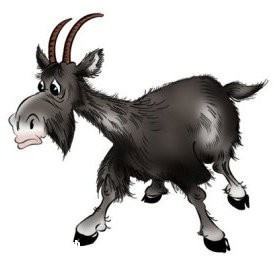
6. "Kazan orphan»
As is known, the expression "Kazan orphan" refers to a person who pretends to be hurt or helpless to someone soften. Now the phrase is used more as a good-natured joke. But why "Kazan"? This idiom came after the conquest of Kazan by Ivan the Terrible. Tatar princes (Mirza) were the subjects of the Russian tsar. At the same time they tried to beg Ivan the Terrible various concessions and benefits, complaining about the bitter fate. They also have become popular due to the sharp language of the first "Kazan orphan."

7. "Do not wash dirty linen in public»
The ancient and universally common proverb. Of course, it does not teach us impropriety. She advises not to make family squabbles and quarrels in people. Dahl generally written beautifully about this saying: "family squabbles sorted out at home, if not under a sheepskin, so under the same roof." But there is this proverb and direct sense: the peasants never litter sweeps or put out. It was quite difficult to do: sweep rubbish on the street through the high thresholds. But the main reason - the existence of a fairly serious beliefs: Copy of evil people can put the spell. Sor usually darted into the oven or cooking corner. When they flooded furnace, burning rubbish. There was also one more interesting custom: wedding guests, testing the patience of the bride, were forced to sweep the house, while again and again littered, saying: "Meti, methylation, but out of the house can not stand, and raking under the bench so on luggage in an oven to smoke issued ".
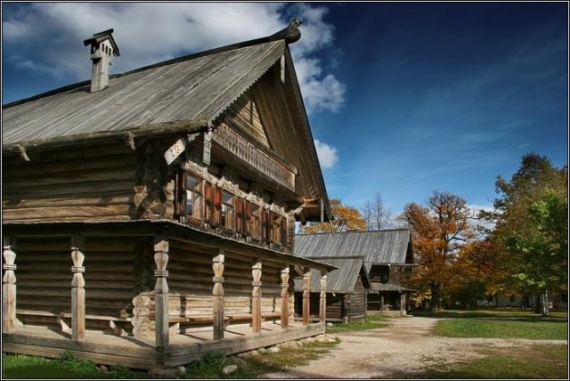
8. "Neither the house nor home»
We speak about the state of extreme poverty. If you parse the content of this proverb, it turns out that there is "no stake" that is short the pointed stick, "no court" - that is, at home. About the "Court" all clear, and disputes on this score there. But what about the "Cola" is a pretty persuasive version of the late nineteenth century. The fact is that, at least in some places, "stake" called the band width of arable land in two fathoms. Therefore, do not have a Coke - therefore have no arable land; the court did not have - hence, to live with others. Well ... it is logical. It is difficult to overestimate, especially in the old days, the value of arable land to peasants. In fact, along with the house, it was his main wealth.

9. "ochumet»
The word "ochumet" is often used in everyday life. As is well known, it is a situation where a person has lost the ability to clearly perceive the surrounding reality, to think properly. Interestingly, the origin of the word is associated with major events in 1771, it was then raging in Moscow devastating plague. Eyewitnesses described the people of the following symptoms: "Reprimand unintelligible patients and zameshatelen language exactly primorozhen or will bite, or a drunk." The plague manifested itself in a fever, heat, headache and dizziness. The memory of the above developments was reflected in the word "ochumet" which we now apply to less serious situations.

10.Popast in a trouble.
Means "to get in trouble, silly, embarrassing or ridiculous, missed the danger." It appeared in the speech of the old Russian spinners, rope masters and formed from a combination of get in a trouble. Word of a trouble in the modern Russian language is lost, since she passed away reality - Rope mill machine, which in the old days suchili ropes, dragged by the spinning wheel to the sledge. When dealing with a trouble spinner at greater risk if the beard, clothing or arm caught in the machine, he could lose not only his beard, but sometimes health or life. The expression to be trapped, trapped where an adverb is formed from a combination of a noun with a preposition, which is traditional for Russian dialects, has lost direct value and is now used only in a figurative, that is, acquired the status of phraseologism. The origin of many Russian phraseology, by the way, is related professional environment.
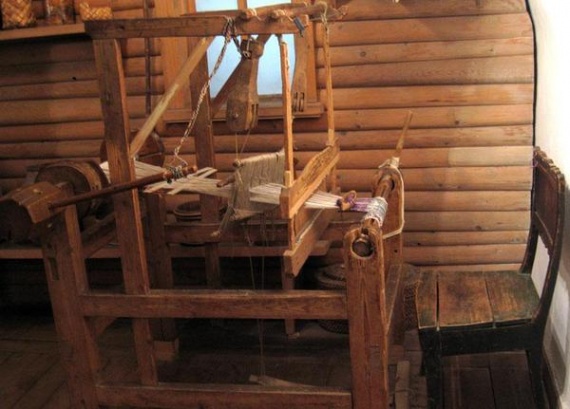
11. Zaruba Single afford it on his nose
This expression is now often say in full confidence that there is a view of the nose. An ordinary human nose. Sometimes more and show on the nose. Meanwhile, it is a mistake ... Nose formerly called a special plaque for the records. It was worn with special sticks, which makes a variety of notes or notches in the memory. Indeed, in ancient times, with all its severity, no memory on his own nose, no nicks did.
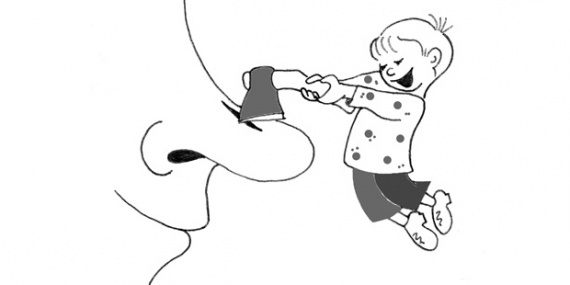
12. Play trifles.
There is such an old game, with which, as we are assured, develop patience and caution: trifles. Before you is a bunch of tiny veshchichek, liqueur glasses, hammer, hearts - spillikins - piled in disarray. I wanted a small hook to pull out of a pile of other trifles so as not to disturb the others. The perfect occupation for idlers! Not surprisingly, the phrase "to play trifles" for a long time already represents: piddle, nonsense, leaving aside the most important and essential.
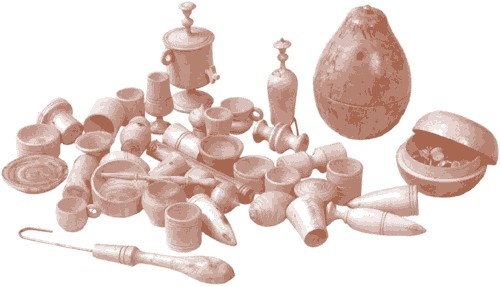
13. "shelved.»
There is an assumption, though this phrase, which means "to cause a long delay," "long delay its decision" has emerged in Muscovy, three hundred years ago. Tsar Alexei, the father of Peter I, ordered the village of Kolomenskoye in front of his palace to establish long box where anyone could drop their complaint. Complaints fell, but to wait for the decisions was not very easy; often before the months and years ahead. People renamed the "long" box in the "long". It is difficult, however, vouch for the accuracy of this explanation: because we say not "drop" or "put" and "shelve". One might think that the expression, if not born, it is stuck in a speech later in the "presence" - institutions of the XIX century. The then government officials, taking various petitions, complaints and requests, of course, sort them into different boxes for. "Debt" could be called that, which postponed most leisurely affairs. It is clear that this box petitioners feared. Incidentally, there is no need to assume that someone once specially renamed "long" box in the "long": in many places of our country in the national language "long" and it means "long". The same meaning is born and later the expression "put on the shelf." Cloth covered tables in the Russian offices.
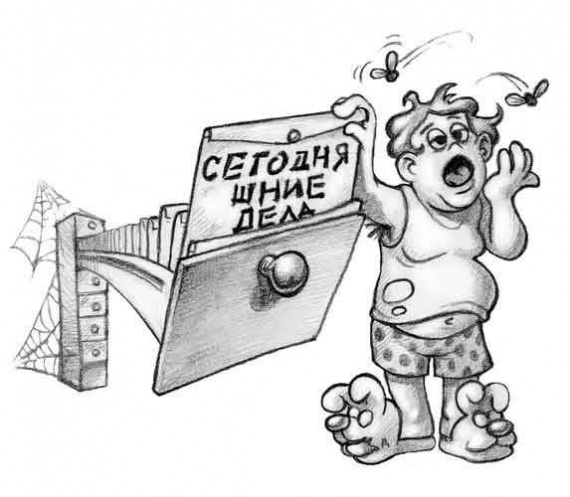
Source: masterok.livejournal.com
1. "led by the nose»
Previously Roma entertain people at fairs, speaking with the bears. They made animal prodelyvat different foci, thus deceiving the promise of handouts. Gypsies drove bear the ring, threaded through the nose. It is in those times "do not lead me by the nose" means "do not lie." But the expression "to know the whole story," ... linked with ancient torture when the accused drove nails under the nails or needles. The purpose of this action was rather unpleasant obtaining recognition.

2. "Master cabbage»
About who is little that can, we say "the master of cabbage." The origin sayings is quite simple. Sour soup (apparently, in the simplest variation) were nemudrёnoy food Water yes sauerkraut. Prepare the soup was not difficult. And if someone called "the master of cabbage", which meant that anything worthwhile he is unfit. The expression "put a pig", that is to make someone something bad, most likely due to the fact that some people for religious reasons do not eat pork. And if a man quietly eating pork underlay, thereby making it a very serious dirty trick.

3. "twiddle»
Today, the expression "twiddle" means do nothing. Meanwhile, earlier bitё thumbs employed. Although quite simple ... Dishes in distant times already mainly made of wood: cups and spoons, "Bratina" and plates - everything was made of wood. But to cut something from the logs needed to chip chock - thumbs. It was easy, trifling matter, which was instructed to apprentices. This activity is called "beat the thumbs." Master jokingly called laborers "baklushechnikami." So, masters of jokes and there was an expression.

4. "I do not hit to the court»
When engaged in the study of proverbs and sayings, wonders of antiquity which they sometimes occur. "I do not fell to the court" - at this saying has an interesting mythological basis. According to her courtyard (in the yard) will live only animal that like houses. And if you do not like it, or run away, or get sick. What to do ... not to the court ...

5. "Scapegoat»
"They found a scapegoat", "who this time will make a scapegoat?" - Such phrases can often be heard at work. Under the "scapegoat" means a person who was hanged on all the flaws, while he may have happened in a very indirect relationship troubles or even be privy to them. This expression has a story ... It was the ancient Jewish rite of absolution, which was attended by a goat. The priest laid his hands on the head of the goat, and the like shifting on him the sins of the people. After this accident, that the sins of the whole nation had a rather weak relationship, we cast out into the wilderness. So it goes. It is not known how many goats, went to the harsh journey for the sins of others, but, fortunately, Rite no longer exists. And the expression still lives.

6. "Kazan orphan»
As is known, the expression "Kazan orphan" refers to a person who pretends to be hurt or helpless to someone soften. Now the phrase is used more as a good-natured joke. But why "Kazan"? This idiom came after the conquest of Kazan by Ivan the Terrible. Tatar princes (Mirza) were the subjects of the Russian tsar. At the same time they tried to beg Ivan the Terrible various concessions and benefits, complaining about the bitter fate. They also have become popular due to the sharp language of the first "Kazan orphan."

7. "Do not wash dirty linen in public»
The ancient and universally common proverb. Of course, it does not teach us impropriety. She advises not to make family squabbles and quarrels in people. Dahl generally written beautifully about this saying: "family squabbles sorted out at home, if not under a sheepskin, so under the same roof." But there is this proverb and direct sense: the peasants never litter sweeps or put out. It was quite difficult to do: sweep rubbish on the street through the high thresholds. But the main reason - the existence of a fairly serious beliefs: Copy of evil people can put the spell. Sor usually darted into the oven or cooking corner. When they flooded furnace, burning rubbish. There was also one more interesting custom: wedding guests, testing the patience of the bride, were forced to sweep the house, while again and again littered, saying: "Meti, methylation, but out of the house can not stand, and raking under the bench so on luggage in an oven to smoke issued ".

8. "Neither the house nor home»
We speak about the state of extreme poverty. If you parse the content of this proverb, it turns out that there is "no stake" that is short the pointed stick, "no court" - that is, at home. About the "Court" all clear, and disputes on this score there. But what about the "Cola" is a pretty persuasive version of the late nineteenth century. The fact is that, at least in some places, "stake" called the band width of arable land in two fathoms. Therefore, do not have a Coke - therefore have no arable land; the court did not have - hence, to live with others. Well ... it is logical. It is difficult to overestimate, especially in the old days, the value of arable land to peasants. In fact, along with the house, it was his main wealth.

9. "ochumet»
The word "ochumet" is often used in everyday life. As is well known, it is a situation where a person has lost the ability to clearly perceive the surrounding reality, to think properly. Interestingly, the origin of the word is associated with major events in 1771, it was then raging in Moscow devastating plague. Eyewitnesses described the people of the following symptoms: "Reprimand unintelligible patients and zameshatelen language exactly primorozhen or will bite, or a drunk." The plague manifested itself in a fever, heat, headache and dizziness. The memory of the above developments was reflected in the word "ochumet" which we now apply to less serious situations.

10.Popast in a trouble.
Means "to get in trouble, silly, embarrassing or ridiculous, missed the danger." It appeared in the speech of the old Russian spinners, rope masters and formed from a combination of get in a trouble. Word of a trouble in the modern Russian language is lost, since she passed away reality - Rope mill machine, which in the old days suchili ropes, dragged by the spinning wheel to the sledge. When dealing with a trouble spinner at greater risk if the beard, clothing or arm caught in the machine, he could lose not only his beard, but sometimes health or life. The expression to be trapped, trapped where an adverb is formed from a combination of a noun with a preposition, which is traditional for Russian dialects, has lost direct value and is now used only in a figurative, that is, acquired the status of phraseologism. The origin of many Russian phraseology, by the way, is related professional environment.

11. Zaruba Single afford it on his nose
This expression is now often say in full confidence that there is a view of the nose. An ordinary human nose. Sometimes more and show on the nose. Meanwhile, it is a mistake ... Nose formerly called a special plaque for the records. It was worn with special sticks, which makes a variety of notes or notches in the memory. Indeed, in ancient times, with all its severity, no memory on his own nose, no nicks did.

12. Play trifles.
There is such an old game, with which, as we are assured, develop patience and caution: trifles. Before you is a bunch of tiny veshchichek, liqueur glasses, hammer, hearts - spillikins - piled in disarray. I wanted a small hook to pull out of a pile of other trifles so as not to disturb the others. The perfect occupation for idlers! Not surprisingly, the phrase "to play trifles" for a long time already represents: piddle, nonsense, leaving aside the most important and essential.

13. "shelved.»
There is an assumption, though this phrase, which means "to cause a long delay," "long delay its decision" has emerged in Muscovy, three hundred years ago. Tsar Alexei, the father of Peter I, ordered the village of Kolomenskoye in front of his palace to establish long box where anyone could drop their complaint. Complaints fell, but to wait for the decisions was not very easy; often before the months and years ahead. People renamed the "long" box in the "long". It is difficult, however, vouch for the accuracy of this explanation: because we say not "drop" or "put" and "shelve". One might think that the expression, if not born, it is stuck in a speech later in the "presence" - institutions of the XIX century. The then government officials, taking various petitions, complaints and requests, of course, sort them into different boxes for. "Debt" could be called that, which postponed most leisurely affairs. It is clear that this box petitioners feared. Incidentally, there is no need to assume that someone once specially renamed "long" box in the "long": in many places of our country in the national language "long" and it means "long". The same meaning is born and later the expression "put on the shelf." Cloth covered tables in the Russian offices.

Source: masterok.livejournal.com
